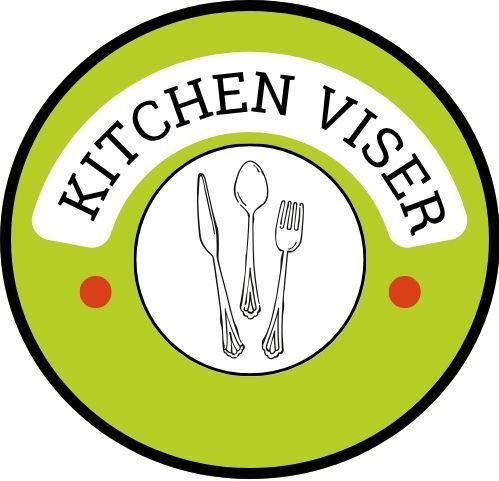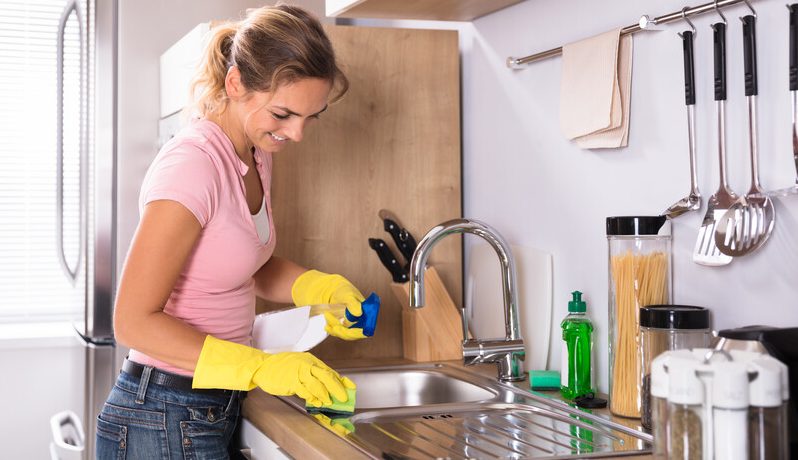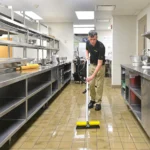Imagine walking into your kitchen and feeling an instant sense of calm. Everything is in its place, surfaces gleam, and you can easily find what you need.
This isn’t just a dream—it’s a reality for those who have mastered the art of keeping their kitchens clean and organized. Do you ever wonder how some people achieve this effortlessly? The secret lies in their habits. By adopting these habits, you can transform your kitchen into a sanctuary that inspires creativity and peace.
Stick with us as we reveal the nine habits of people with a clean kitchen. You might find a few surprises and practical tips that you can start applying today. Curious to know what they are? Let’s dive in and discover how you can make a spotless kitchen your reality.
Daily Cleaning Routine
A clean kitchen starts with simple daily habits. Wash dishes right after use to prevent buildup. Wipe down surfaces daily to remove crumbs and spills. Regularly organize pantry and fridge to keep everything in its place. These small actions make maintaining a tidy kitchen effortless.
A clean kitchen is the heart of a happy home, and maintaining it daily can seem daunting. But a daily cleaning routine can make all the difference in keeping your kitchen sparkling. With a few simple habits, you can enjoy a tidy space that makes cooking and hosting a breeze.Wiping Surfaces Regularly
One habit that stands out among those with clean kitchens is wiping surfaces regularly. After each meal, take a moment to wipe down countertops, the dining table, and other frequently used surfaces. This quick action prevents crumbs from becoming a sticky mess and keeps germs at bay. Imagine the satisfaction of walking into a kitchen that greets you with cleanliness every time you enter.Sweeping And Mopping Floors
A kitchen floor sees its fair share of spills and crumbs. Regular sweeping and mopping ensure that dirt doesn’t accumulate. Consider spending just five minutes a day sweeping, and schedule a thorough mopping once a week. It’s surprising how much more welcoming a kitchen feels with a clean floor underfoot. Adopting these habits into your daily routine is easier than you might think. Picture this: you’re in the kitchen, making your morning coffee. As you wait for it to brew, you quickly wipe down the counter. Later, while dinner simmers, you grab a broom and sweep the floor. These small actions become second nature and transform your kitchen into a clean and inviting space. Do you find yourself overwhelmed by kitchen mess? Start small. Implement these habits and notice the difference. What new habits could you add to keep your kitchen pristine? Your kitchen deserves the best, and with these practices, it can shine every day.Organized Storage
Organized storage is the backbone of a clean kitchen. When your kitchen is clutter-free, it becomes easier to cook, clean, and enjoy your space. By adopting smart storage habits, you can transform your kitchen into a more functional and inviting area.
Using Labels
Labels are a game changer for keeping track of what’s where in your kitchen. Have you ever grabbed the wrong spice while cooking? It’s frustrating! Labeling jars and containers can prevent these mix-ups. You don’t need fancy labels; a simple sticky note or tape can do the trick.
Consider labeling shelves too. This can help everyone in the house know exactly where things belong, making it easier to put them back after use. Labeling reduces the time spent searching for items, giving you more time to enjoy your culinary creations.
Efficient Cabinet Arrangements
Have you ever opened a cabinet only to be greeted by an avalanche of pots and pans? Efficient cabinet arrangements can prevent this chaos. Start by grouping similar items together. Keep all baking supplies in one area, and cooking pots in another. It makes grabbing what you need a breeze.
Use cabinet organizers to maximize space. Think of stackable shelves or pull-out trays. These tools can help you use every inch of your cabinet. You might even find space for those gadgets you rarely use but still want to keep.
Have you ever considered the height of your cabinets? Store frequently used items at eye level. Save the top shelves for things you rarely use, like holiday-themed dishes. This simple trick can save you time and prevent unnecessary strain.
What would your kitchen look like if you adopted these storage habits? Perhaps it’s time to give them a try and see the transformation for yourself.
Minimal Clutter
A clean kitchen often begins with the practice of maintaining minimal clutter. This approach not only keeps your space organized but also makes it more inviting and functional. Imagine walking into a kitchen where surfaces are clear, and everything has its place. It feels refreshing, doesn’t it? Let’s dive into how you can achieve minimal clutter in your kitchen.
Keeping Counters Clear
Clear counters are the cornerstone of a tidy kitchen. They provide space for cooking and make cleaning easier. Start by removing items that don’t belong on the counter. Do you really need that stack of mail or a collection of mismatched mugs taking up space? Store essential items like a coffee maker or toaster neatly, but resist the urge to overcrowd.
Think about the last time you tried to prepare a meal in a cluttered space. Frustrating, right? Keeping counters clear reduces stress and boosts efficiency. Consider using wall-mounted shelves or hooks to keep frequently used items within reach but off the counter.
Decluttering Regularly
Regular decluttering is vital for a clean kitchen. Set aside time each week to assess and remove unnecessary items. During a recent declutter session, I discovered expired spices and duplicate utensils. What hidden treasures might you find?
As you declutter, ask yourself: Does this item serve a purpose? If not, it may be time to let it go. Create a habit of routinely evaluating your kitchen possessions. This practice not only keeps clutter at bay but also helps you make room for items that truly enhance your cooking experience.
Minimal clutter transforms your kitchen into a space that inspires and energizes. By keeping counters clear and decluttering regularly, you pave the way for a cleaner, more enjoyable cooking environment. What changes will you make today to embrace minimal clutter in your kitchen?

Credit: www.instagram.com
Regular Inventory Checks
Keeping track of kitchen inventory prevents clutter and ensures everything is in its right place. Regular checks help maintain order, reducing wasted food and saving money. This habit fosters a tidy and efficient cooking space.
A clean kitchen is often the heart of a happy home. One key habit that keeps it organized is regular inventory checks. By routinely taking stock of what you have, you ensure that your kitchen is efficient and functional. This simple practice not only saves you money but also reduces food waste. It’s like a mini audit for your pantry and fridge, helping you manage your supplies smartly.Managing Expiry Dates
Keeping track of expiry dates is crucial for a clean kitchen. It prevents unpleasant surprises when you reach for an ingredient only to find it’s expired. Consider adopting a system where you arrange items by their expiry dates. Place older items at the front and newer ones at the back. This way, you use up products while they’re still fresh, minimizing waste.Avoiding Overbuying
Overbuying can quickly turn your kitchen into a cluttered mess. Regular inventory checks help you purchase only what you need. Make a shopping list based on what you already have. This not only keeps your kitchen organized but also saves you money. Have you ever bought a second bottle of ketchup only to discover you already had two? Avoiding this is as simple as knowing your stock. Regular inventory checks are like a safety net, ensuring you never face the chaos of expired goods or crowded shelves. If you’ve ever found yourself wondering how many cans of beans are too many, this habit is your answer. It’s about making your kitchen work for you, not against you.Smart Waste Management
Having a clean kitchen isn’t just about wiping surfaces and organizing shelves; it’s also about managing waste effectively. Smart waste management is a cornerstone habit of those who maintain spotless kitchens. By adopting efficient recycling practices and composting tips, you not only keep your kitchen tidy but also contribute positively to the environment.
Recycling Practices
Recycling in the kitchen starts with sorting. Keep separate bins for plastics, glass, and paper. Label them clearly. This makes it easier to toss items in the right bin.
Consider using clear bags for recyclables. It’s easier to spot contamination, ensuring only the correct items are recycled.
Do you know which items are recyclable? Check local guidelines. Many people unknowingly toss non-recyclable items in the bin, causing issues at recycling centers.
Personal experience has taught me that rinsing containers is crucial. It prevents odors and pests, maintaining a clean kitchen environment.
Composting Tips
Composting is a great way to manage organic waste. It turns kitchen scraps into nutrient-rich soil.
Start small. Use a countertop compost bin for easy access. This encourages consistent use, minimizing landfill contributions.
What can you compost? Fruit peels, coffee grounds, and eggshells are perfect. Avoid meat and dairy—they attract pests.
A little secret: adding shredded newspaper to your compost bin helps balance moisture and enhance decomposition.
Efficient waste management transforms your kitchen into a cleaner, greener space. What steps will you take to improve your waste management habits today?
Effective Meal Planning
A clean kitchen begins with effective meal planning. People with tidy kitchens often keep countertops clutter-free and store kitchen tools properly. They regularly check their pantry and organize ingredients, making meal preparation easier and more efficient.
A clean kitchen is often the heart of a well-organized home, and effective meal planning plays a crucial role in maintaining this order. When you plan your meals, you not only save time but also reduce food waste and stress. Imagine opening your fridge and knowing exactly what’s for dinner each night. Effective meal planning can make this a reality.Weekly Menu Preparation
Creating a weekly menu is the cornerstone of effective meal planning. Start by setting aside a specific time each week to plan your meals. Use this time to take stock of what you have on hand, so you can avoid unnecessary purchases. Consider the preferences and dietary needs of your household. Are there specific nights that are busier than others? Plan for quick and easy meals on those days. You might want to try a themed dinner night, like Taco Tuesday or Pasta Friday, to add a fun twist.Shopping List Essentials
Once your weekly menu is set, it’s time to create a shopping list. A well-crafted list helps you navigate the grocery store efficiently and prevents impulse buying. Organize your list by categories such as produce, dairy, and pantry staples. This saves time and ensures you don’t miss anything important. Stick to your list to keep your shopping trip focused and budget-friendly. Remember to check your pantry and fridge before you head out. You might discover you already have some of the ingredients you need. This not only saves money but also helps in reducing food waste. Have you ever returned from the store only to realize you forgot a key ingredient? A comprehensive shopping list can prevent this common frustration. By incorporating these habits into your routine, you’ll not only maintain a clean kitchen but also create a more efficient and enjoyable cooking experience. What’s one meal planning habit you find indispensable?Quick Clean-ups
Keeping a kitchen clean can feel like a challenge. Quick clean-ups make it manageable. These small efforts prevent mess from piling up. A tidy kitchen is more inviting and functional. Let’s explore some effective strategies.
Post-cooking Tidying
After cooking, clean up immediately. Wash pots and pans as you go. Wipe down surfaces right after use. This habit stops grime from building up. It makes future cleaning easier.
Spot Cleaning Techniques
Spot cleaning targets specific messes. Use a damp cloth for spills. Keep a small brush for crumbs. Tackle stains with a gentle cleaner. These small actions maintain a clean space. It saves time in the long run.

Credit: www.youtube.com
Maintenance Of Appliances
Maintaining kitchen appliances enhances cleanliness and efficiency. Regularly wiping and inspecting ensures optimal performance and hygiene. These habits contribute to a tidy and organized kitchen space.
Maintaining your kitchen appliances is crucial for a spotless and efficient kitchen. With regular care, these workhorses can last longer and perform better, saving you time and money. Let’s dive into two essential aspects of appliance maintenance that can help keep your kitchen in tip-top shape.Regular Deep Cleaning
Deep cleaning your appliances isn’t just about aesthetics; it’s about functionality and hygiene. Start by setting a monthly schedule to thoroughly clean each appliance. For your refrigerator, remove all items and wipe down the shelves with a mixture of water and vinegar. Think about the last time you cleaned your oven. If you can’t remember, it might be time for a deep clean. Use a baking soda paste to tackle burnt-on stains without harsh chemicals. This ensures your oven heats evenly and doesn’t alter the taste of your food. Don’t forget smaller appliances. Your coffee maker, for instance, can harbor mold and bacteria. Run a cycle with vinegar followed by water to keep it clean and your coffee tasting fresh.Checking For Repairs
A stitch in time saves nine, especially with kitchen appliances. Regularly inspect your appliances for signs of wear and tear. Listen for unusual noises in your dishwasher or washing machine; these could indicate a problem that needs attention. Are your refrigerator seals tight? A simple test with a piece of paper can tell you. Close the door on the paper and see if it slides easily. If it does, your seals might need replacing to keep your fridge energy-efficient. Don’t ignore small issues. A leaking tap or a flickering light in your oven can escalate if left unchecked. By addressing repairs promptly, you avoid bigger problems and maintain a smoothly running kitchen. When was the last time you checked the hoses on your washing machine or dishwasher? These can crack over time and cause major leaks. Regular checks prevent surprises and keep your kitchen dry and safe. Taking these small steps can make a big difference in maintaining a clean and efficient kitchen. What habits have you formed to keep your appliances in top condition?Incorporating Family Involvement
A clean kitchen is often a family affair. By involving everyone in the household, you not only maintain a tidy space but also foster teamwork and responsibility. Wondering how to get everyone on board? Here are some practical tips to make it happen.
Assigning Tasks
Start by dividing kitchen duties among family members. This can be as simple as assigning dishwashing to one person and countertop cleaning to another. Make sure tasks align with each person’s skills and availability.
Consider using a rotation system to keep things fair and varied. This approach prevents burnout and keeps everyone engaged. Remember, even young children can help with simple tasks like wiping down tables or sorting utensils.
Creating Cleaning Schedules
Having a cleaning schedule can work wonders for maintaining a clean kitchen. Decide on a weekly or bi-weekly plan that outlines who does what and when. This brings clarity and prevents last-minute scrambles to tidy up.
Use a calendar or a shared app to keep track of assignments and deadlines. This makes it easy for everyone to know their responsibilities and helps avoid conflicts. A consistent schedule can make kitchen cleaning feel less like a chore and more like a routine.
Have you ever noticed how a shared goal can bring people together? By involving your family in kitchen upkeep, you not only create a cleaner home but also strengthen your family bond. Try these strategies and see how your kitchen transforms into a space everyone is proud of!
:max_bytes(150000):strip_icc()/GettyImages-1581660164-8c986c8b667a4b17b6fd404dedd6b6ca.jpg)
Credit: www.southernliving.com
Frequently Asked Questions
How Do Clean Kitchen Habits Impact Health?
Clean kitchen habits reduce germs. They prevent food contamination. Less clutter means fewer accidents. Overall, cleaner kitchens promote better health.
What Are The Most Common Cleaning Tools?
Common tools include microfiber cloths, sponges, and scrub brushes. Dish soap and disinfectants are essential. Keep them handy for daily use.
How Often Should You Clean Your Kitchen?
Daily cleaning is ideal. Wipe surfaces, wash dishes, and tidy up. Weekly deep cleaning helps maintain hygiene and order.
Why Is Organizing Kitchen Essential?
Organizing saves time. It reduces stress and prevents accidents. Knowing where items are makes cooking smoother and enjoyable.
Conclusion
Keeping your kitchen clean can seem tough. But, these nine habits help. Start small and build your routine. Regular cleaning saves time and stress. Use natural cleaners for safety. Organize items for easy access. Quick cleanup after cooking prevents mess.
Clean spills immediately to avoid stains. Wash dishes right away for a tidy sink. Keep countertops clutter-free. A clean kitchen brings peace and order. It also makes cooking more enjoyable. Adopt these habits. Enjoy a sparkling kitchen every day. Stay consistent for the best results.
Your kitchen deserves the care. Happy cleaning!

Yes, working as , Food Blogger and Product Reviewer for last 6 years. Here you will get amazing deals for Smart kitchen products. I am your best source for the latest update in cooking trends. I provide insightful articles, reviews, and analysis on cutting-edge kitchen gadget. My mission is to empower readers with the knowledge they need to stay ahead in a rapidly evolving coking world. Join me as we explore the future of food technology and how it shapes our lives today and tomorrow.




